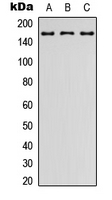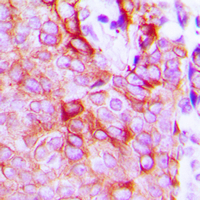Anti-LPHN2 Antibody
- SPECIFICATION
- CITATIONS
- PROTOCOLS
- BACKGROUND

Application
| WB, IHC |
|---|---|
| Primary Accession | O95490 |
| Reactivity | Human, Mouse, Rat |
| Host | Rabbit |
| Clonality | Polyclonal |
| Calculated MW | 163349 Da |
| Gene ID | 23266 |
|---|---|
| Other Names | KIAA0786; LEC1; LPHH1; Latrophilin-2; Calcium-independent alpha-latrotoxin receptor 2; CIRL-2; Latrophilin homolog 1; Lectomedin-1 |
| Target/Specificity | Recognizes endogenous levels of LPHN2 protein. |
| Dilution | WB~~1/500 - 1/1000 IHC~~1:100~500 |
| Format | Liquid in 0.42% Potassium phosphate, 0.87% Sodium chloride, pH 7.3, 30% glycerol, and 0.09% (W/V) sodium azide. |
| Storage | Store at -20 °C.Stable for 12 months from date of receipt |
| Name | ADGRL2 (HGNC:18582) |
|---|---|
| Function | Orphan adhesion G-protein coupled receptor (aGPCR), which mediates synapse specificity (By similarity). Ligand binding causes a conformation change that triggers signaling via guanine nucleotide- binding proteins (G proteins) and modulates the activity of downstream effectors (By similarity). Following G-protein coupled receptor activation, associates with cell adhesion molecules that are expressed at the surface of adjacent cells to direct synapse specificity. Specifically mediates the establishment of perforant-path synapses on CA1-region pyramidal neurons in the hippocampus. Localizes to postsynaptic spines in excitatory synapses in the S.lacunosum- moleculare and interacts with presynaptic cell adhesion molecules, such as teneurins, promoting synapse formation (By similarity). |
| Cellular Location | Postsynaptic cell membrane {ECO:0000250|UniProtKB:Q8JZZ7}; Multi-pass membrane protein |
| Tissue Location | Expressed very widely in all normal tissues tested. Expression is variable in tumor cell lines, apparently elevated in some lines and absent or markedly reduced in others |

Thousands of laboratories across the world have published research that depended on the performance of antibodies from Abcepta to advance their research. Check out links to articles that cite our products in major peer-reviewed journals, organized by research category.
info@abcepta.com, and receive a free "I Love Antibodies" mug.
Provided below are standard protocols that you may find useful for product applications.
Background
Rabbit polyclonal antibody to LPHN2
If you have used an Abcepta product and would like to share how it has performed, please click on the "Submit Review" button and provide the requested information. Our staff will examine and post your review and contact you if needed.
If you have any additional inquiries please email technical services at tech@abcepta.com.













 Foundational characteristics of cancer include proliferation, angiogenesis, migration, evasion of apoptosis, and cellular immortality. Find key markers for these cellular processes and antibodies to detect them.
Foundational characteristics of cancer include proliferation, angiogenesis, migration, evasion of apoptosis, and cellular immortality. Find key markers for these cellular processes and antibodies to detect them. The SUMOplot™ Analysis Program predicts and scores sumoylation sites in your protein. SUMOylation is a post-translational modification involved in various cellular processes, such as nuclear-cytosolic transport, transcriptional regulation, apoptosis, protein stability, response to stress, and progression through the cell cycle.
The SUMOplot™ Analysis Program predicts and scores sumoylation sites in your protein. SUMOylation is a post-translational modification involved in various cellular processes, such as nuclear-cytosolic transport, transcriptional regulation, apoptosis, protein stability, response to stress, and progression through the cell cycle. The Autophagy Receptor Motif Plotter predicts and scores autophagy receptor binding sites in your protein. Identifying proteins connected to this pathway is critical to understanding the role of autophagy in physiological as well as pathological processes such as development, differentiation, neurodegenerative diseases, stress, infection, and cancer.
The Autophagy Receptor Motif Plotter predicts and scores autophagy receptor binding sites in your protein. Identifying proteins connected to this pathway is critical to understanding the role of autophagy in physiological as well as pathological processes such as development, differentiation, neurodegenerative diseases, stress, infection, and cancer.



